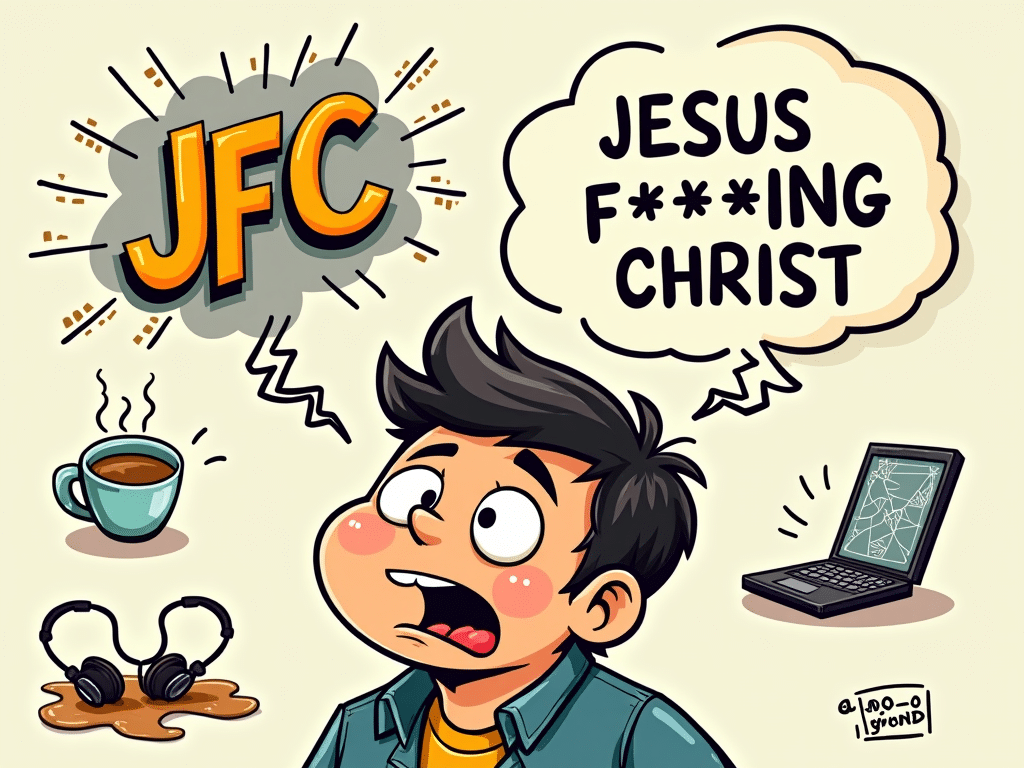Ever stumbled upon "jfc" in a text or social media post and felt completely out of the loop? You're not alone, and deciphering this increasingly common initialism is key to understanding modern digital communication.
The internet, with its ever-evolving lexicon, constantly births new slang terms, acronyms, and abbreviations. Among these, "jfc" has carved out a significant niche, particularly within younger demographics and online communities. While seemingly cryptic to the uninitiated, "jfc" carries a potent meaning, acting as a verbal shortcut for a sentiment many find themselves expressing online and in text messages.
At its core, "jfc" is an initialism, a string of letters representing a longer phrase. Specifically, it stands for "jesus fucking christ." This phrase, typically considered a vulgar exclamation, is employed to express a range of intense emotions. Its use is far from random, as the emotional weight of the phrase directly translates into its abbreviation. The intensity of the phrase underscores the intensity of the emotion being conveyed.
- Carl Bernsteins Wives From Carol Honsa To Nora Ephron More
- Jake Marlin Jessica Aldeans Husband From Lineman To Fame
The primary emotion "jfc" conveys is often one of exasperation or frustration. Imagine a situation where everything seems to be going wrong: a delayed flight, a missed deadline, a series of unfortunate events piling up. In these moments, the sentiment behind "jfc" perfectly encapsulates the overwhelming feeling of "Can you believe this is happening?!"
Beyond simple frustration, "jfc" can also express shock or disbelief. Think of witnessing an unbelievable sporting upset, hearing an outlandish piece of gossip, or encountering a shocking plot twist in a movie. The utterance of "jfc" underscores the sheer astonishment at the unexpected or extraordinary nature of the event.
The versatility of "jfc" extends beyond negative emotions. It can also be used to emphasize a feeling, even a positive one. For example, one might use it to express intense excitement about an upcoming vacation, the thrill of seeing a favorite band perform live, or the overwhelming joy of a personal achievement. The use of "jfc" in these contexts amplifies the positive emotion, conveying a sense of heightened enthusiasm.
- Cricket Streaming Guide Find Matches More Year
- Michelle Makori News Net Worth Career Secrets Revealed
The origins of "jfc" are, unsurprisingly, rooted in informal speech. The full phrase "jesus fucking christ" has long been used as an exclamation, typically in situations of high emotion. Over time, as digital communication became more prevalent, the phrase was shortened to its initialism for brevity and ease of typing. The acronym allowed individuals to express the same sentiment without typing out the potentially offensive full phrase.
The rise of social media platforms and text messaging further cemented the popularity of "jfc." Character limits, the desire for quick communication, and the generally informal nature of these platforms all contributed to its widespread adoption. "Jfc" became a convenient and efficient way to express strong emotions in the digital sphere.
While the meaning of "jfc" remains consistent across various platforms, its usage can vary depending on the specific context. In a casual text message between friends, "jfc" might be used liberally to express everyday frustrations. However, in a more professional setting, such as an email to a colleague, the use of "jfc" would be highly inappropriate due to its vulgar nature.
Understanding the audience is crucial when considering whether to use "jfc." Some individuals may find the term offensive, regardless of the context. Others may be more accepting of its use, particularly within informal settings. It's essential to gauge the recipient's potential reaction before deploying this particular initialism.
In online forums and comment sections, "jfc" can be used to express disagreement or disapproval. However, it's important to note that using "jfc" in this manner can often be perceived as aggressive or confrontational. A more constructive approach would be to express disagreement respectfully and provide reasoned arguments.
When used in response to a question, "jfc" can indicate disbelief or incredulity. For example, if someone asks a question with an obvious answer, a response of "jfc" might imply, "Are you serious?" or "Is that even a real question?"
The pronunciation of "jfc" also varies. Some individuals pronounce each letter individually, as in "jay-eff-cee." This pronunciation is often considered less offensive than saying the full phrase. Others may pronounce it as a single syllable, rhyming with words like "sniff" or "cliff." Regardless of the pronunciation, the meaning remains the same.
While "jfc" primarily stands for "jesus fucking christ," it's important to acknowledge that, like many slang terms, it can occasionally take on other meanings depending on the community or context. These alternative meanings are far less common, but it's useful to be aware of their existence.
One alternative meaning, albeit rare, is "Java Foundation Classes." This refers to a set of graphical user interface (GUI) components for the Java programming language. However, outside of a highly technical context, it's unlikely that "jfc" would be interpreted this way.
In certain online gaming communities, "jfc" might be used as a shorthand for a specific in-game strategy or tactic. For example, it could refer to a coordinated attack or a particular way of approaching a challenge. However, this usage is highly specific to the game and community in question.
It's crucial to emphasize that these alternative meanings are the exception, not the rule. In the vast majority of cases, "jfc" will be understood as an abbreviation for "jesus fucking christ." Therefore, when encountering this initialism, it's safe to assume that the user is expressing a strong emotion, typically of frustration, shock, or emphasis.
Consider the following examples to illustrate the diverse ways in which "jfc" can be used:
Example 1: "My flight was delayed AGAIN! Jfc, I'm never going to make it to this meeting." In this case, "jfc" expresses frustration with the repeated delays.
Example 2: "Did you see that catch?! Jfc, that was unbelievable!" Here, "jfc" emphasizes the speaker's shock and amazement at the incredible athletic feat.
Example 3: "I finally finished my dissertation! Jfc, I can't believe it's over." In this context, "jfc" conveys the speaker's excitement and relief at completing a challenging task.
Example 4: "My car broke down on the highway... jfc." This expresses annoyance at the car trouble.
Example 5: "Jfc, this line is so long." This expresses frustration with a long wait.
The prevalence of "jfc" in digital communication is undeniable. According to some sources, it appears in approximately 3 out of every 100 text messages. While the exact figures may vary, this statistic highlights the widespread use of the term, particularly among younger generations.
Studies have shown that millennials and Gen Z individuals are more likely to use "jfc" in their text conversations than older demographics. This is likely due to a combination of factors, including greater familiarity with internet slang, a more relaxed attitude toward potentially offensive language, and a stronger presence on social media platforms.
However, it's important to remember that the use of "jfc" is not limited to younger generations. Many individuals across different age groups have adopted the term into their digital vocabulary, particularly those who are active in online communities or frequently engage in text-based communication.
Despite its popularity, "jfc" remains a potentially offensive term. Its use of religious language in a vulgar manner can be deeply offensive to some individuals, particularly those with strong religious beliefs. Therefore, it's essential to exercise caution and consider the potential impact of using "jfc" before deploying it in any communication.
If you're unsure whether a particular person will be offended by "jfc," it's best to err on the side of caution and avoid using the term altogether. There are plenty of alternative ways to express strong emotions without resorting to potentially offensive language.
Consider using less offensive alternatives such as "OMG," "WTF," or "Seriously?!" These terms convey a similar sense of surprise or frustration without the potential to offend.
Another approach is to use descriptive language to express your emotions. Instead of saying "jfc," try saying "I can't believe this is happening!" or "This is so frustrating!" This allows you to convey your feelings without resorting to vulgar language.
Ultimately, the decision of whether or not to use "jfc" is a personal one. However, it's important to be aware of the potential consequences of using potentially offensive language and to exercise caution when communicating with individuals whose sensitivities are unknown.
The expression "jfc" is a prime example of how language evolves and adapts in the digital age. While its origins may be rooted in vulgarity, its widespread adoption and diverse usage demonstrate the power of internet slang to shape communication.
Understanding the meaning and context of "jfc" is essential for navigating the complexities of online discourse. By recognizing its potential to both connect and offend, individuals can use this initialism thoughtfully and responsibly.
The ongoing evolution of internet slang ensures that new terms and abbreviations will continue to emerge. Staying informed about these linguistic trends is crucial for effective communication and for avoiding misunderstandings in the ever-changing digital landscape.
The proliferation of "jfc" also raises broader questions about the acceptability of offensive language in online spaces. While some argue that freedom of expression should be paramount, others emphasize the importance of creating inclusive and respectful online communities. Finding a balance between these competing values remains a challenge for individuals and platforms alike.
The meaning of "jfc" when used by a girl directed towards a guy is, like most slang, heavily dependent on context and the specific relationship between the two individuals. There is no single, definitive interpretation.
In some cases, "jfc" could simply be an expression of frustration or annoyance, directed at the situation rather than the guy himself. The girl might be experiencing a problem and using "jfc" as a general exclamation of exasperation.
However, if the "jfc" is delivered with a certain tone or accompanied by other cues, it could indicate disapproval or disappointment with the guy's actions or words. The girl might be expressing her disbelief or frustration with something he did or said.
Conversely, in a more playful or sarcastic context, "jfc" could even be used as a lighthearted jab or a way of teasing the guy. The girl might be using it to express mild amusement or disbelief at something he did or said, without any real malice.
Ultimately, the best way to understand the meaning of "jfc" in this situation is to consider the context, the relationship between the two individuals, and any accompanying cues such as tone of voice, facial expressions, or other nonverbal communication. If there is any ambiguity, it's always best to ask for clarification to avoid misunderstandings.
Understanding the cultural context is also important. The acceptability and interpretation of slang terms like "jfc" can vary significantly depending on the region, social group, and online community. What might be considered harmless banter in one context could be seen as offensive in another.
As digital communication becomes increasingly pervasive, it's crucial to develop strong communication skills, including the ability to interpret slang and other forms of informal language. This requires not only understanding the literal definitions of these terms but also being sensitive to the nuances of context and social dynamics.
By paying attention to the subtle cues that accompany digital communication, individuals can navigate the complexities of online interactions more effectively and avoid misunderstandings. This includes being mindful of the potential impact of one's own language and being willing to ask for clarification when needed.
The study of internet slang is a fascinating window into the ever-changing nature of language and culture. As new technologies and platforms emerge, new forms of communication will undoubtedly evolve, presenting both opportunities and challenges for individuals and communities alike.
- Jessica Ussery Jake Marlin Their Love Story Updated
- Michelle Makori News Net Worth Career Secrets Revealed


